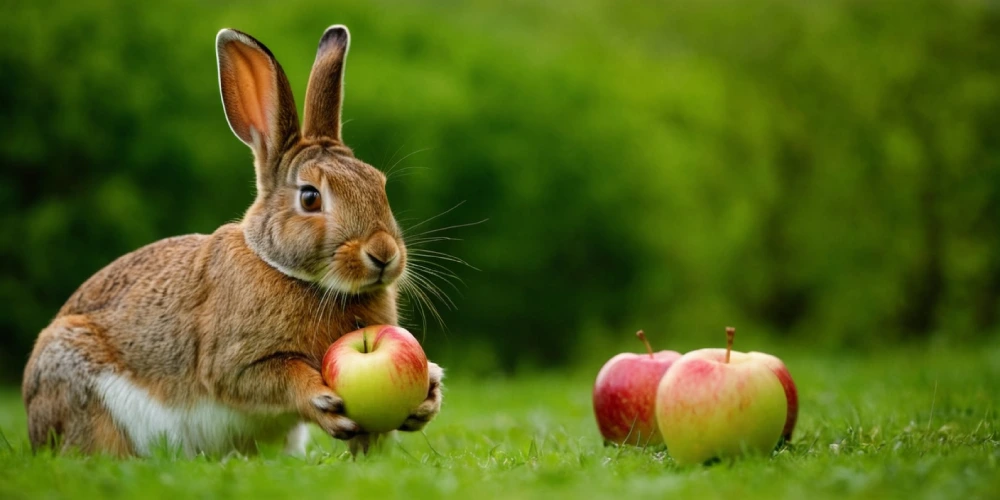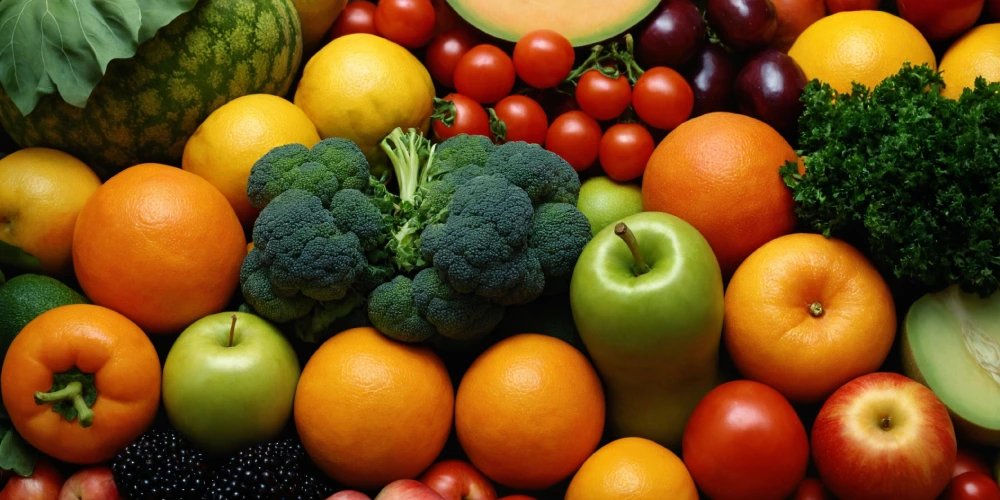
Can Rabbits Have Apples? Yes! Apples Are Safe for Rabbits
Rabbits are herbivores with sensitive digestive systems, primarily requiring hay, leafy greens, and some pellets for optimal health. Fruits like apples can be a delightful addition to their diet, but they must be offered carefully. The nutritional advantages of apples for rabbits, possible hazards, safe feeding techniques, and substitutes for apples are all covered in this article to guarantee a varied and well-balanced diet.
Nutritional Benefits of Apples for Rabbits
Consumed in moderation, apples are a natural source of vital nutrients that would help rabbits. They are mainly known for their vitamins, fiber, and water content.
Rich in Vitamins
Apples contain vitamins A and C, which support a rabbit’s immune system and promote overall health. Your rabbit will look and feel its best thanks to these vitamins, which also assist in maintaining healthy skin and fur.
High in Fiber
Fiber is crucial for a rabbit’s digestive health. While apples are not as fibrous as hay, they still provide some dietary fiber that aids in digestion and supports the gut microbiome.
Hydration
Apples, with a water content of around 86%, can help keep rabbits hydrated, particularly in warm weather. However, this should be different from the need for constant access to fresh water.
Risks of Feeding Apples to Rabbits
Despite their benefits, apples also come with risks if not prepared or offered appropriately. Overfeeding apples can lead to health problems due to their sugar content and other factors.
High Sugar Levels
Apples contain natural sugars, which can upset a rabbit’s sensitive digestive system. In rabbits, too much sugar can cause gastrointestinal stasis, which is a severe and sometimes fatal condition, obesity, and diarrhea.
Toxic Seeds and Core
Apple seeds contain amygdalin, a compound that can release cyanide when ingested. Even small amounts can be harmful to rabbits. Before serving apples, permanently remove the core and seeds.
Skin Sensitivity
Some rabbits may struggle with the skin of apples, especially if it has pesticide residues. In addition to ensuring safety, peeling the apple facilitates chewing and digestion for your rabbit.
How to Safely Feed Apples to Rabbits
To include apples safely in your rabbit’s diet, follow these steps:
Preparation
- Choose Organic Apples: Whenever possible, select organic apples to minimize exposure to pesticides.
- Wash Thoroughly: Rinse apples under running water to remove dirt and chemical residues.
- Peel the Skin: If the apple is not organic, peel off the skin to ensure safety.
- Remove the Seeds and Core: Ensure there are no seeds, stems, or core fragments, as these are harmful to rabbits.
- Cut into Small Pieces: Slice the apple into small, manageable portions to prevent choking.
Serving Size and Frequency
Apples should only be an occasional treat. Limit serving size based on your rabbit’s weight and size:
- Small rabbits: A thin slice once a week.
- Medium rabbits: A couple of small slices up to twice a week.
- Giant rabbits: Up to three small slices weekly.
How Apples Fit into a Rabbit’s Diet
A rabbit’s diet should primarily consist of:
- Hay (75-80%): Essential for dental health and digestion.
- Fresh Vegetables (10-15%): Leafy greens like kale, parsley, and romaine lettuce.
- Pellets (5%): Supplementary nutrition in small amounts.
- Treats (Less than 5%): Fruits like apples, berries, or bananas.
Apples should never replace staple foods like hay or leafy greens. They are best used as a reward or a way to bond with your rabbit.
Can All Rabbits Eat Apples?
Not all rabbits tolerate apples equally. Factors like age, health, and digestive sensitivity can affect whether apples are suitable.
Young Rabbits
Baby rabbits under 12 weeks old should not eat apples or any other fruit. Their digestive systems are still developing, and the high sugar content can cause digestive upset.
Older Rabbits
Senior rabbits may enjoy apples, but they should be given in smaller quantities due to the potential for weight gain and other age-related health concerns.
Rabbits with Health Issues
If your rabbit has diabetes, obesity, or digestive problems, avoid apples altogether. Prior to introducing new foods, always get your veterinarian’s approval.

Alternatives to Apples for Rabbits
If you want to diversify your rabbit’s treats, there are many healthy options to consider.
Fruits
- Blueberries: Low in sugar and high in antioxidants.
- Strawberries: Sweet but safe in moderation.
- Pineapple: Contains digestive enzymes but should be given sparingly.
Vegetables
- Carrots: Sweet and crunchy but should be limited due to sugar.
- Bell Peppers: low in sugar and high in vitamin C.
- Cucumber: A hydrating and low-calorie option.
Herbs
- Cilantro: Aromatic and nutritious.
- Mint: A refreshing and safe choice for rabbits.
Offering a variety of foods ensures your rabbit receives balanced nutrition while preventing boredom.
Signs of Overfeeding Apples
It’s crucial to monitor your rabbit for any signs of overfeeding or adverse reactions to apples. Symptoms may include:
- Digestive Issues: Diarrhea, bloating, or unusual stool consistency.
- Weight Gain: Overconsumption of sugar can eventually result in obesity.
- Behavioral Changes: Reduced activity or signs of discomfort may indicate digestive distress.
If you notice any of these signs, discontinue apples and consult a veterinarian.
Conclusion
Apples can be a delightful and nourishing treat for rabbits if they are given sparingly and prepared correctly. While they provide essential nutrients like vitamins and fiber, the risks of sugar content and toxic seeds must not be overlooked. By following proper feeding guidelines and maintaining a balanced diet, you can safely include apples as an occasional indulgence for your furry companion.
FAQs
1.Can rabbits eat dried apples?
Dried apples are not ideal for rabbits as they contain concentrated sugar, which is much higher than in fresh apples. Avoid feeding dried fruits to prevent health problems.
2.Are apple leaves safe for rabbits?
Yes, rabbits can safely and naturally eat untreated apple leaves from a pesticide-free tree. Make sure the leaves are clean and fresh before serving.
3.How often can rabbits eat apples?
Rabbits can have apples once or twice a week in small amounts. Overfeeding may result in digestive problems or obesity.
4.Can rabbits eat green apples?
Green apples, like Granny Smith, are slightly lower in sugar than red apples. They can be given in the exact small quantities but require the same preparation steps.
5.What should I do if my rabbit eats an apple seed?
Should your rabbit unintentionally eat an apple seed, watch for symptoms of discomfort, such as leth, including appetite loss appetite
